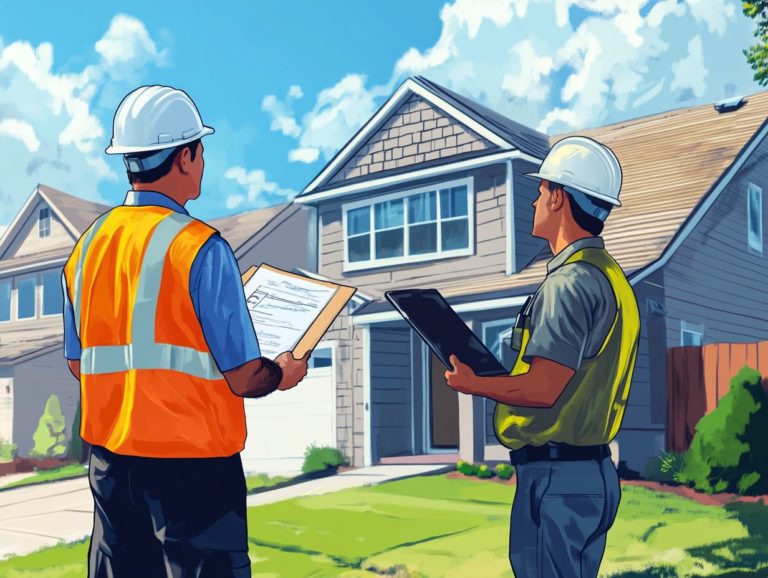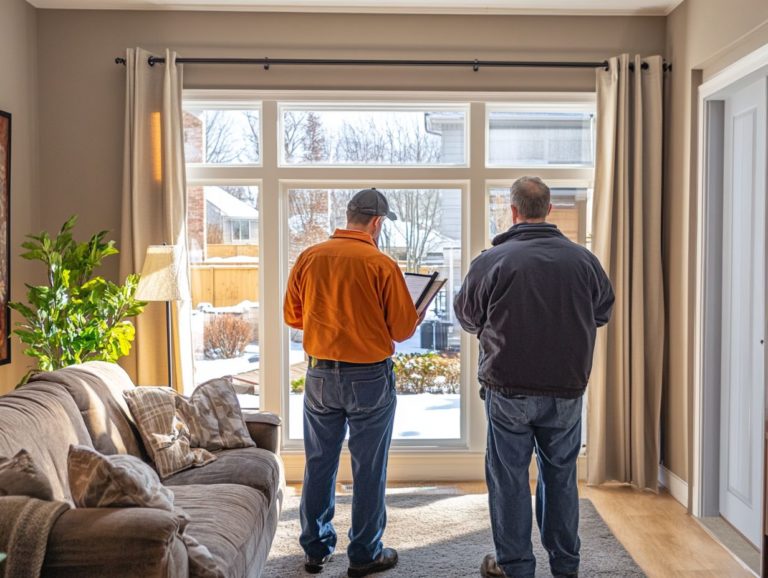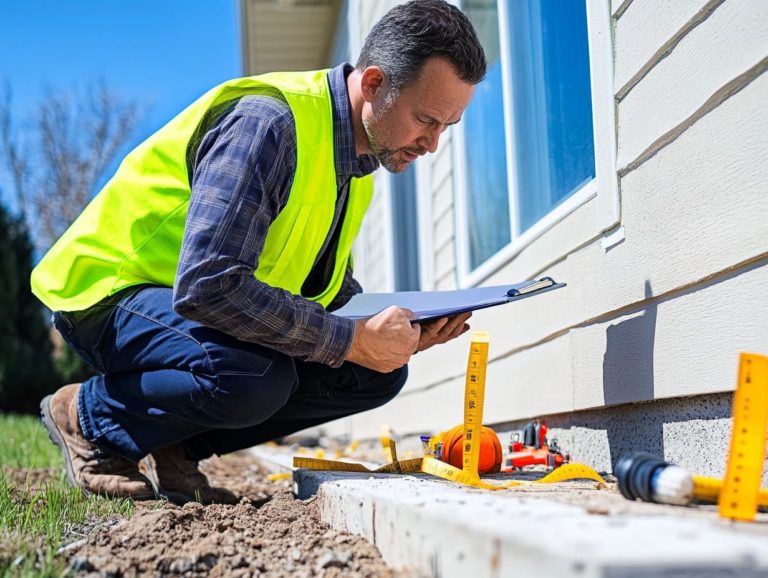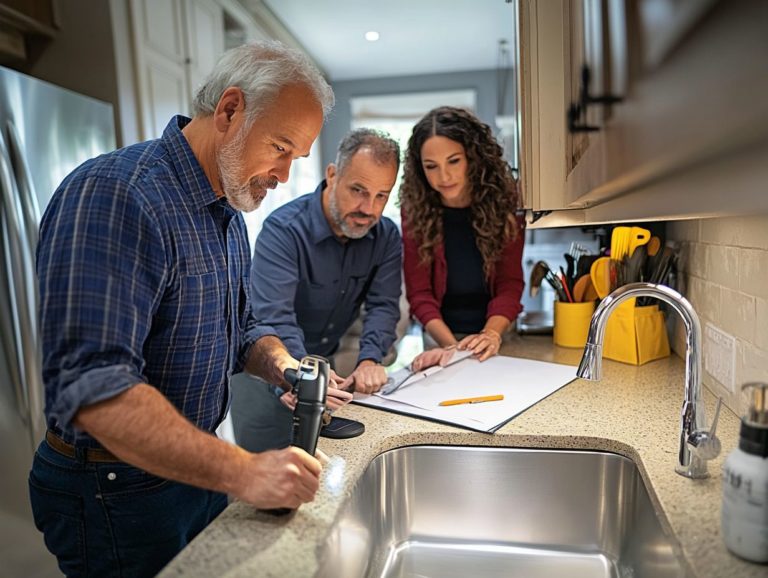How to Prepare for a Home Inspection
Buying or selling a home can be both exhilarating and intimidating. One of the most vital steps in this journey is the home inspection.
This guide delves into the purpose and significance of home inspections and how to effectively prepare for and navigate the inspection process. Whether you re a buyer looking for reassurance or a seller eager to boost your property’s allure, you ll discover insights into interpreting inspection reports and tackling any concerns that may emerge.
Arm yourself with the knowledge needed to make informed decisions throughout your real estate journey!
Contents
Key Takeaways:

A home inspection is a crucial step in the home buying and selling process, providing important information about the condition of the property.
Prepare for a home inspection by taking necessary steps such as cleaning, organizing, and completing repairs beforehand.
Understand and interpret the inspection report to determine any necessary repairs or renegotiations.
Effective communication and negotiation skills are key in addressing issues found during the inspection.
What is a Home Inspection?
A home inspection is an in-depth evaluation performed by a qualified home inspector to assess the condition of a property. It pinpoints any potential issues that could impact its safety, value, and marketability.
This thorough process examines a range of critical elements, including structural features, electrical systems, plumbing, roofing, and heating, ventilation, and air conditioning systems. All of these play a vital role in the home s overall integrity.
Armed with an inspection report, both home sellers and buyers are enabled to make informed decisions throughout the home sale process.
Why is a Home Inspection Important?
Don t skip the home inspection it s crucial for your peace of mind! A home inspection offers critical insights into the property’s condition that can shape your decision-making process and negotiation tactics.
For buyers, a comprehensive inspection reveals hidden issues like water damage or safety hazards that could significantly affect your investment. Sellers can leverage the inspection findings to tackle potential repairs and enhance their home s value before hitting the market.
Preparing for a Home Inspection
Preparing for a home inspection is essential for both sellers and buyers. Knowing how to prepare for a home inspection as a buyer makes the process easier and leads to favorable outcomes.
This preparation includes creating a thorough cleaning checklist to declutter the property. Additionally, you should prepare for a home inspection by ensuring clear access to crucial inspection areas such as attics, crawl spaces, and utility connections.
By keeping these access points unobstructed, you showcase your readiness and create a positive atmosphere for inspection day. Well-maintained properties often command better selling prices, so these steps can significantly enhance your position in the market.
What to Expect During a Home Inspection
During a home inspection, anticipate a comprehensive evaluation of the property’s various components, expertly carried out by a qualified home inspector. This thorough assessment will cover crucial areas such as the foundation, roofing, plumbing, electrical systems, and appliances.
The inspector will diligently document their findings, focusing on potential issues like pest infestations or water damage. Familiarizing yourself with this process enables you to navigate the subsequent steps in your buying or selling journey with confidence.
Interpreting the Inspection Report
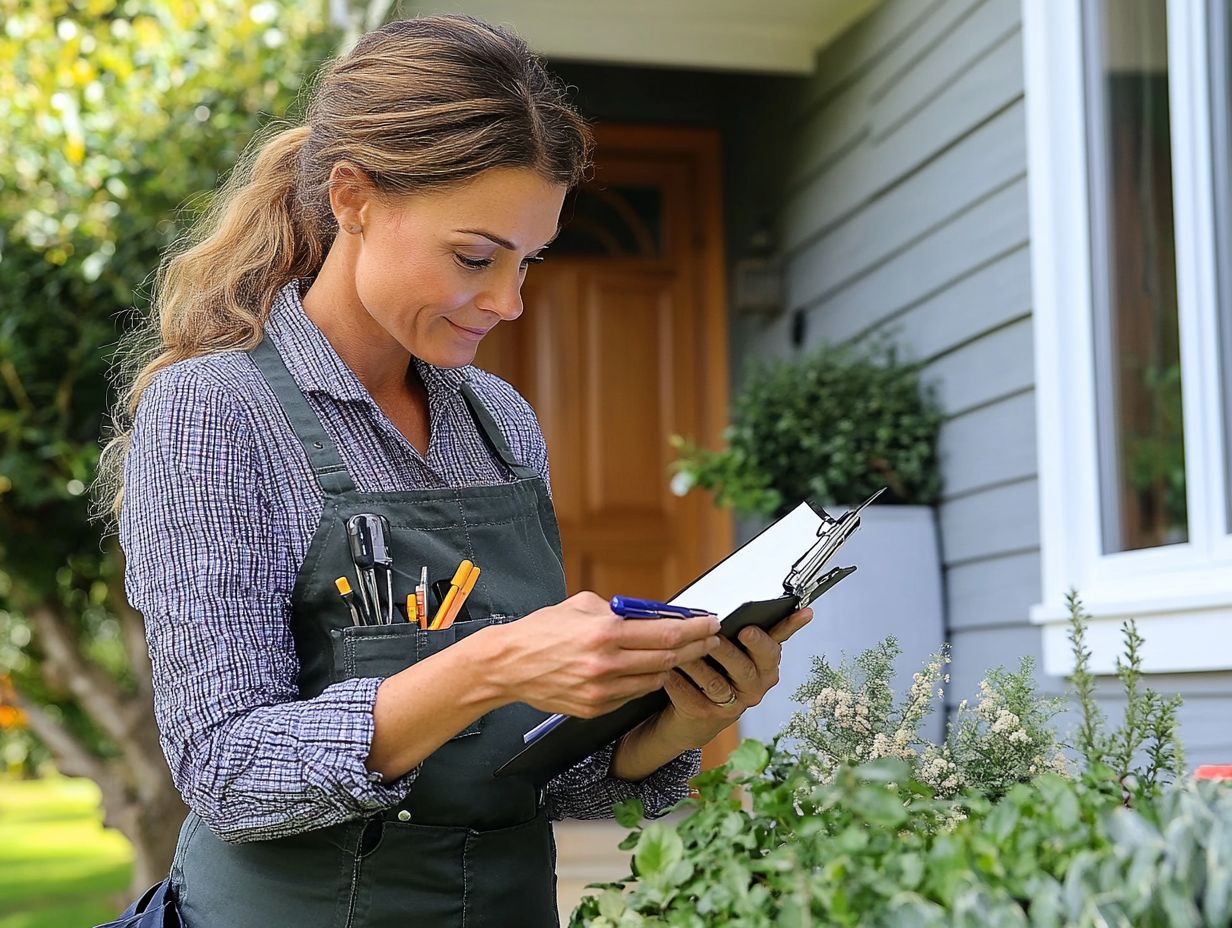
Interpreting the inspection report is an essential part of the home sale process. It offers both buyers and sellers a comprehensive view of the property’s condition and identifies any issues that may need attention.
By understanding the results of the inspection, you can strategically tackle repair estimates and negotiate effectively with potential buyers. Meanwhile, buyers can evaluate whether the property’s condition meets their expectations and fits within their budget.
Ultimately, this report acts as a roadmap, guiding you through the subsequent steps of the selling and buying journey. Get ready to make informed decisions that can save you money and stress!
Addressing Issues Found in the Inspection
Addressing the issues highlighted in the inspection report is crucial for you, whether you’re a home seller or buyer. It significantly impacts the negotiation process and can influence the final selling price.
As a seller, be ready to negotiate repairs or price adjustments based on the inspection findings. This might mean tackling important repairs like fixing electrical issues, addressing plumbing concerns, or managing pest control.
For buyers, this is your chance to leverage the inspection results to renegotiate the price or request specific repairs before sealing the deal.
Tips for a Successful Home Inspection
A successful home inspection relies on careful planning and a mutual understanding between buyers and sellers, paving the way for a smooth process.
As a buyer, be sure to arrive with your questions ready for the inspector, demonstrating your diligence and commitment. For sellers, focusing on accessibility and safety for the inspection team is crucial. Consider following these tips for a successful home inspection day to ensure everything goes smoothly.
Engaging in proactive inspection prep like fixing leaks, maintaining the roof, and ensuring all utilities are connected can significantly enhance your home s overall appeal and value in the marketplace.
Explanation and Purpose
A home inspection evaluates the overall condition of the property to uncover any existing or potential issues that might impact safety and value.
This vital process benefits buyers, who seek reassurance before committing to such a significant purchase, and also sellers, who can tackle necessary repairs to boost their property s appeal.
By carefully assessing essential elements like the roof, plumbing, and electrical systems, an inspection offers an objective perspective on the home s condition. This means buyers can negotiate with greater confidence, while sellers enjoy enhanced transparency throughout the transaction.
Ultimately, this fosters trust between both parties and paves the way for smoother closings.
Benefits for Buyers and Sellers
The benefits of a home inspection are significant for both buyers and sellers. It enhances your negotiation power, equips you to make informed decisions, and potentially saves you money by uncovering hidden issues before the sale is finalized.
By investing in a thorough evaluation, you gain invaluable insights into the property’s condition, paving the way for a smoother transaction. If you re a buyer, understanding existing problems can enable you to negotiate repair costs or request allowances, effectively safeguarding your financial interests.
On the selling side, conducting a pre-inspection can unveil issues before they derail negotiations, allowing you to address concerns proactively. This strategic approach streamlines the buying and selling process and cultivates trust between all parties involved.
Ultimately, it leads to a more successful transfer of ownership and protects you against unforeseen expenses down the line.
Steps to Take Before the Inspection
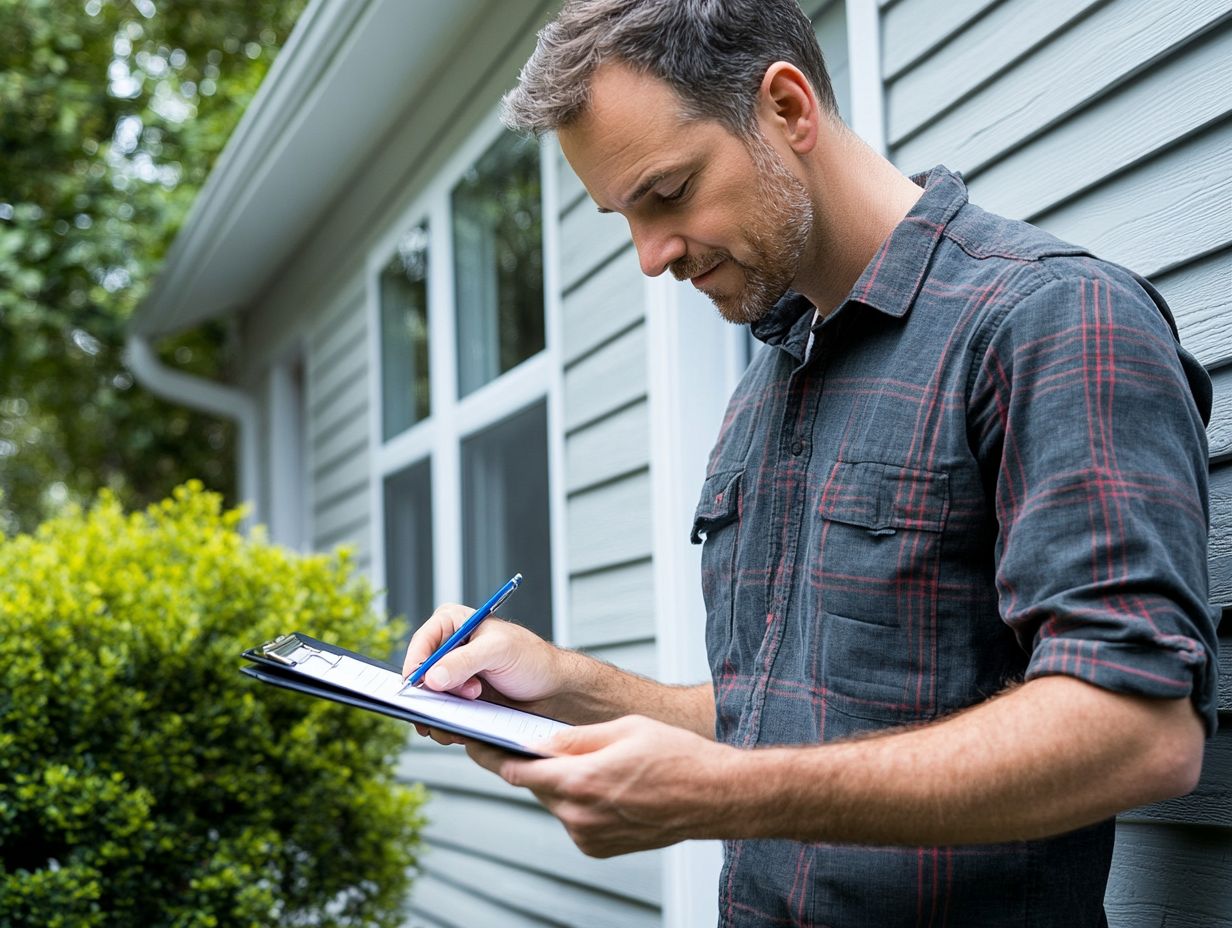
Before a home inspection, it’s vital for you, whether you’re buying or selling, to take certain steps to prepare for a successful home inspection.
Start by creating a comprehensive cleaning checklist, decluttering the space, and ensuring that all critical areas are easily accessible. Focus on high-traffic areas and surfaces that tend to collect dust and grime.
Next, decluttering is crucial it allows inspectors to accurately assess the property s true condition. Consider boxing up unused items and clearing out personal belongings for a more inviting space.
Don t overlook accessibility make sure that areas like the attic, basement, and utility rooms are easy for inspectors to reach, as these spaces require thorough evaluation.
Lastly, document any repairs or maintenance records. This transparency fosters trust and paves the way for smoother negotiations down the line.
Process and Areas Inspected
The home inspection process entails a thorough evaluation of various components, including structural features, roof maintenance, appliance checks, and foundation assessments. This method aims to uncover potential issues within the home.
Professionals typically start by assessing the structural integrity. They carefully examine walls, ceilings, and floors for any signs of damage or weakness.
Next, they dive into the roofing conditions, looking for leaks and wear that could lead to significant repair costs down the line.
Inspectors also take a close look at essential systems like plumbing, electrical wiring, and HVAC setups. They ensure that everything meets current safety standards.
Equipped with tools like moisture meters and thermal imaging cameras, they can detect hidden problems that might escape the naked eye.
This careful method highlights existing issues and provides a complete understanding of the property’s condition. It is an essential step in your home buying or selling journey.
Understanding the Results and Next Steps
Understanding the results of the inspection report is essential for you, whether you’re a buyer or a seller. It outlines the key findings and serves as a guide to help you determine the appropriate next steps in the selling process.
When interpreting the inspection report, assess the severity of highlighted issues. Pay attention to structural concerns or electrical deficiencies.
These factors can significantly impact property value and negotiations. For you as a buyer, this means weighing the costs of necessary repairs against your investment.
On the flip side, if you re selling, you might contemplate whether to address the issues before listing your property or to adjust your pricing strategy accordingly.
By drawing insights from the report, engage in informed discussions with the other party. This paves the way for resolutions that align with your goals, whether that involves making repairs, requesting concessions, or considering outright price adjustments.
Negotiating Repairs and Renegotiating Price
Negotiating repairs and possibly revisiting the price based on inspection findings is a vital step in the home selling process. It enables both parties to arrive at a fair agreement.
This stage not only addresses any pressing issues but also builds trust between the buyer and seller.
To tackle repairs efficiently, meticulously review the inspection report and prioritize which repairs are essential for closing the deal.
A strategic approach balancing your willingness to address significant issues while preserving the property’s value can be highly advantageous.
For instance, presenting quotes from licensed contractors can enhance your negotiation discussions and instill confidence in the buyer regarding the home’s integrity.
Offering allowances instead of direct repairs provides flexibility, catering to those who may have their own preferred repair methods.
Ultimately, reaching a mutually agreeable adjustment can pave the way for a successful transaction that satisfies everyone involved.
Advice for Buyers and Sellers
Get ready to dive into the home inspection process! It’s essential for both buyers and sellers to engage in thorough preparation, including knowing how to prepare for a home inspection as a seller, and maintain open lines of communication.
Cultivating a clear understanding of the property’s condition ensures a smooth transaction and a great experience.
Prioritize conducting research on common issues prevalent in your local market. Consider enlisting the expertise of seasoned inspectors who can provide comprehensive reports.
As a buyer, take the time to jot down any specific concerns you may have prior to the inspection. Understanding what to expect with a home inspection allows you to address potential risks and fosters a constructive dialogue with the seller.
For sellers, adopting a proactive stance is crucial. Being transparent about known issues and having repair estimates at the ready can significantly enhance the negotiation process.
This commitment to effective communication ultimately leads to smoother negotiations and a more satisfying experience for everyone involved.
Frequently Asked Questions

What is a home inspection?
A home inspection is a visual examination of the condition of homes structure and systems. This includes the roof, plumbing, electrical, heating and cooling, and appliances.
Why is it important to prepare for a home inspection?
Preparing for a home inspection helps ensure any potential problems are identified and fixed before selling your home. Knowing how to prepare for a home inspection prevents surprises or delays during the buying process.
What are some basic steps to prepare for a home inspection?
Getting ready for your inspection is key to a smooth home sale. Start by cleaning and decluttering your home, and consider following these best practices for home inspection preparation.
Turn on water, gas, and electricity. Ensure all areas are easily accessible for the inspector.
Should I be present during the home inspection?
You should definitely be present during the home inspection to ask questions and gain a better understanding of your home’s condition.
What are some common issues found during a home inspection?
Common problems found during a home inspection include electrical issues, plumbing leaks, roof damage, and heating or cooling system problems.
Fixing these problems early can save you time and money later.
What are some tips for a successful home inspection?
Keep your home clean and well-maintained. Fix any minor repairs before the inspection.
Be open and honest with the inspector about any concerns and have all necessary documents ready for review.

